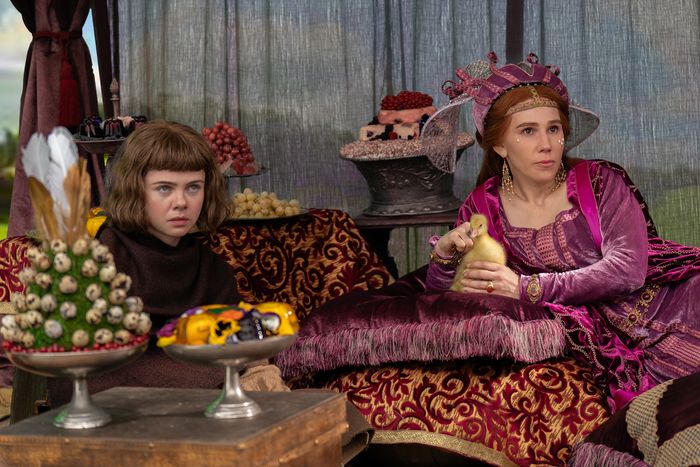
This article was featured in One Great Story, New York’s reading recommendation newsletter. Sign up here to get it nightly.
When Derry Girls, the Channel 4 sitcom turned Netflix comedy juggernaut, ended in 2022 after a rapturously received three-season run, actress Saoirse-Monica Jackson found it hard to fully separate from her character. Jackson was 23 when she was cast as Erin Quinn, the ambitious, face-pulling, somewhat arrogant ringleader of a posse of teenagers in Northern Ireland at the tail end of the Troubles.
“I was growing as a young woman in my early 20s, leading this massive, successful show, and my own personal growth was so woven in and running parallel to the story lines,” Jackson tells me during a late pasta lunch in early June in London’s Shoreditch neighborhood. Her real life then wasn’t quite as chaotic and ridiculous as Erin’s, but they were learning similar lessons, like the importance of “standing up for yourself and discovering that you’re enough.” Even as the show earned accolades, Jackson was riddled with insecurities about her place in the industry. “I get anxiety sometimes thinking about my early 20s,” Jackson says. “It feels like one big panic attack — one big blur of messy mistakes.”
Jackson is petite — she is often mistaken for a teenager — with an open, friendly face; wide-set green eyes; and a snub nose capable of fantastic comedic contortions, all framed by loose blonde curls. She’s funny and has the type of self-effacing charm that puts people around her at ease. When I apologize at one point for speaking with a mouthful of bread and prosciutto, she waves me off. “I have terrible table manners,” she says. “You can eat with your foot if you like.”
Derry Girls was, without question, “the best thing that ever happened to me,” Jackson says. Before landing the role, she had appeared in a few episodes of a Sky TV thriller for which she left the Arden School of Theatre a year early, and she had also starred in a traveling theater production of Of Mice and Men as Curley’s wife as well as in a West End production of the 2017 play The Ferryman. But those roles couldn’t sustain her full time; she’d been working outside the industry too, often juggling multiple jobs, doing market research on vape pens in Manchester and, before her Derry Girls audition, selling HelloFresh boxes door-to-door. Becoming Erin Quinn changed everything.
But Jackson worried in Derry Girls’s aftermath that the show might limit her professionally. Would her famous gurning get her typecast in broad, slapstick-comedy roles? She was “hell-bent on doing a different accent” to prove her acting chops and crossover appeal; she had her heart set on a meaty British drama, something serious and dark. Then, not long after the Derry Girls finale aired, she got the opportunity to audition for a new Netflix comedy before any of the scripts had been finished. She knew only that her potential character, Misia, would be bringing a dead body into a villa where a ragtag group of nobles and servants are seeking refuge as the black plague ravages 14th-century Florence. “I didn’t need to know anything else,” Jackson says.
That show, The Decameron, comes out in late July. Loosely based on Giovanni Boccaccio’s 14th-century short-story collection of the same name, the series is a soapy, borderline absurdist black comedy from showrunner Kathleen Jordan, who previously created Teenage Bounty Hunters, the short-lived Netflix dramedy about twin teens wrestling with the demands of an Evangelical high school and criminal pursuits. There hasn’t been another modern TV series quite like The Decameron, in which the nobles and servants flirt, fuck, class-switch, and backstab their way through the lavish Italian countryside in pursuit of power or at least survival.
As Misia, an all-too-eager loyal servant to a cruel and vain padrona played by Zosia Mamet, Jackson doesn’t only bring her signature comedic timing and hilarious expressions to the role; she captures the devastation inherent in toxic co-dependency and longing for a narcissist’s love. Misia slowly and subtly transforms from what Jackson calls “the most sad and pathetic character in the villa” to someone who understands and owns her desires. Who better to bring her to life than Jackson, who imbues the sad-clown archetype with such remarkable humanity that she makes you feel like you’re watching the world fall apart on her face? When the going gets tough, Jackson says, “you’ll either laugh or you’ll cry.”
Jackson grew up between Derry, with a load of aunts, uncles, siblings, and cousins constantly streaming in and out of the family home, and, across the border, the fishing village of Greencastle in County Donegal, Ireland, where her parents ran a local inn in the early aughts. “The only way to be noticed by adults was by being funny,” she says. “You can look at that in two ways: character building or neglect.” She jokes. (She described being bullied in the last couple years of Catholic school similarly: “That’s why I’m so funny.”)
Jackson emulated Robin Williams as a child; his performance in the opening scenes of Mrs. Doubtfire made her want to become a voice actor. Her parents were supportive of her dreams, so much so she never thought she’d need a plan B. “Well, pet, if you want to be an actress, you should do it because you don’t want to regret it,” she says her dad, an engineer who became a small-business owner, told her when she was young.
When she landed Derry Girls, Jackson remembers her fellow cast members thinking it was a very special show, but they weren’t sure how well it would do. Jackson, meanwhile, says she knew the series would be a hit from the start. “I was a wee smarty-pants,” she says.
But not even Jackson could have anticipated the pop-cultural phenomenon Derry Girls became. She saw herself painted onto a tourist-attracting mural in her hometown, her character was referenced in the U.K. Parliament, and more than half of Northern Ireland’s TV audience watched the show, making it the biggest series in the country’s history since recordkeeping began in 2002.
Working on Derry Girls and other shows in the U.K. meant she was never far from her family. So it was daunting, at first, to be so far away for seven months in Rome while shooting The Decameron, for which Jackson had gone through an exhausting multi-round interview process. “Not that I’ve ever had a bad experience,” she says, “but I’m always a bit nervous doing ensemble pieces. You really hope that your castmates are playful and that it’s a fun experience. With comedy, there has to be a positive atmosphere on set; that space to play is really important.”
Jackson wasn’t disappointed. The Decameron’s cast, a blend of established comedy talents such as Jackson and Tony Hale and newer actors, bonded straight away. “Sometimes you just get lucky and you’re paired with other actors with whom you have that instant connection,” says Mamet, who plays Pampinea, a noblewoman who arrives at the villa in hopes of marrying its viscount and making the place her home with her trusty servant Misia at her side. “A great blessing of working with Saoirse is that she is extremely committed to finding emotional truth,” says series creator Jordan. “She cared for Misia in a way that no one else could.”
Mamet and Jackson have fabulous chemistry as the ditzy, selfish padrona intent on her own happily ever after and the lowly, devoted servant who, as social mores break down amid the chaos of the plague, learns to start advocating for herself instead of her tormentor. “She’s a master class,” Mamet says. “She looks at you and she just cracks you open.” Jackson and Mamet were encouraged to improvise, and they could riff off each other for ages. “We both come from a similar place where we didn’t set out to be comedic actors,” says Mamet. “But the industry sort of molded us to be that and I guess guided us in that way. We both discovered that comedy and tragedy are so intrinsically linked, and when you get to play that thin line between both of those worlds, it’s actually the most rewarding as an actor.” Hale was cast as one of the villa’s few remaining servants, a bumbling but amiable steward named Sirisco. He kept a running list of Jackson’s catchphrases on set: She describes herself sometimes, for example, as being “up to high doh,” or running on jumpy, nervous-but-excited energy. She has “an incredibly quick wit,” Hale says.
These days, Jackson lives with her fiancé, the Scottish DJ Denis Sulta (real name Hector Barbour), whom she met at a party thrown by mutual friends. When she first saw him, he was wearing a Santa suit; it was October. Jackson thought, “That’s the man for me.” When they were considering where to put down roots, the couple initially looked in London, where Jackson had been living, before eventually settling in Liverpool. They both appreciate the benefits of a smaller city, where “you’re not running about all the time. It’s nice for me to be out of the showbiz bubble sometimes and just have a chiller, easier pace of life. We’re at a weird point in our lives where we don’t know what the next couple of years will look like — not weird but exciting,” she says. Liverpool puts them smack in between their respective families in Scotland and Ireland, so for now, at least, it’s home. You might find them at a local arcade that “I’m pretty sure is targeted for kids and teens,” Jackson says, where she’ll play every game and save air hockey for last. “I don’t mean to brag, but I am exceptional at air hockey,” she says. It’s how she lets off steam — that, as well as “exercise and a good night out.” She feels like she has her shit together if she’s got lipstick on and her handbag clean “without a half-eaten bag of crisps spilled all over the bottom of it.”
She’s also absolutely obsessed with television. “I will tell you I’ve never met anybody who watches as much television as I do,” she says. “I love nothing more than a Saturday where I just close the blinds and binge.” She recently tore through Sharp Objects; next on her list is Game of Thrones and House of the Dragon, the latter starring her friend Olivia Cooke, whom she met when they were both young actors in London. (They haven’t seen each other since Jackson’s move to Liverpool a few years ago — “Olivia’s been so busy with all the dragons and stuff.”) Although she’s watched Queen Charlotte and the first two seasons of Bridgerton, Jackson hasn’t yet seen its new season with her old Derry Girls castmate Nicola Coughlan, but “it’s definitely on the list.” Has she talked with Coughlan since her meteoric rise, now that they’re both starring in big Netflix ensemble shows? “I think the both of us are so busy, so no, I haven’t been in touch,” Jackson says.
Earlier this year, Jackson finally landed a starring role in a BBC drama, as she’d always dreamed; this one is a family crime epic called This City Is Ours, also starring Sean Bean, in which she plays a Scouser, or a native of Liverpool, with an accent as noticeable as Jackson’s own. Her character, Cheryl Crawford, is a young woman married to a drug dealer, whom she believes is “quite a good guy — he makes her laugh and is loyal — but he’s quite often an idiot, and she feels like an outcast,” says Jackson. “Doing an accent when I have such a distinct one is scary,” she adds, but it’s also exciting to be able to “slip into the character” with a particular voice, as she did for a small role in 2023’s superhero blockbuster The Flash, in which she played an American.
Before she got on set for This City Is Ours, which is currently in production, Jackson nearly “psyched herself out” of believing she could make a dramatic leap. “It’s maybe part of my creative process,” she says. “Excitement, panic, relax. It’s exhausting doing that over and over again. Maybe we’ll talk in a couple years and you’ll be like, ‘Are you still doing that?’ I’ll have to let you know.” She just turned 30, and she has high hopes for the next decade. “I’ve heard it’s the best era. I see this with my mom and my aunties or even Jamie-Lee,” she says, referring to O’Donnell, her Derry Girls co-star and close friend. “They all give less of a fuck than I do. I’m really looking forward to that happening, but I haven’t really had it kick in yet. When does that kick in, not giving a fuck? When does that happen?”



